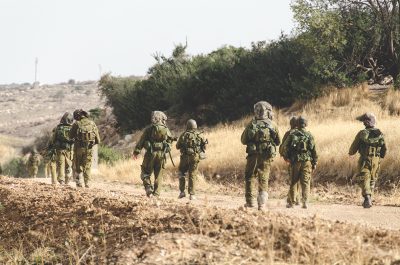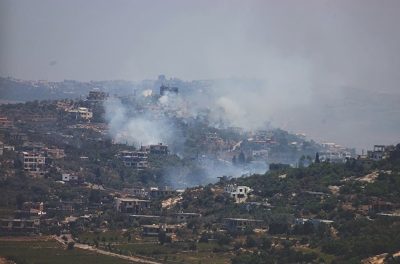×


We have detected your country as:
Please click here to go to the USA website or select another country from the dropdown list.
Israel experienced a heat wave over the summer so extreme that one day in August, flights at Ben-Gurion airport were delayed because the heat was affecting technical systems and control units. But it wasn’t just the temperature that spiked over the summer. Tensions in the north of Israel also spiked with Hezbollah—an Iran-backed terror group based in Lebanon—prompting the question: Are Israel and Hezbollah headed for war?
Hezbollah—designated as a terrorist group by the US, the UK, Germany, the Arab League and Israel—was born out of the Islamic Revolution of 1979 and the Lebanese Civil War. It is a Shiite Islamist group that almost since its birth has been funded, trained and armed by Iran’s Islamic Revolutionary Guard Corps (IRGC) as a way to extend Iran’s reach further west. More than just a proxy for Iran, Hezbollah takes its orders directly from Tehran.
The group’s objective is to wipe Israel off the map and kill Jews.
 The Blue Line
The Blue LineHezbollah took increasingly bold steps over the past months, first by violating the Blue Line, the boundary between Israel and Lebanon. It cannot be defined as a technical border, as a border is an agreed-upon boundary by two parties. Lebanon, however, does not recognize Israel as a sovereign state.
In the 1970s and the 1980s, Palestinian terrorists used southern Lebanon as a launching pad to attack Israelis, prompting the Israeli military to establish a presence in the area to defend its citizens until the Israel Defense Forces (IDF) fully withdrew from southern Lebanon in 2000.
The Blue Line—named for the blue barrels that comprise the line—is monitored by the specially established United Nations Interim Force in Lebanon (UNIFIL).
For an extra layer of security, Israel built a fence on the Israeli side of the Blue Line, ranging from a few meters away from the blue barrels to a few hundred meters, depending on the terrain.
Throughout the summer of 2006, Hezbollah continually launched cross-border attacks against Israeli civilians and soldiers, firing rockets that wounded and killed civilians, attacking IDF posts and kidnapping Israeli soldiers. Israel responded by striking Hezbollah terror targets, prompting back-and-forth attacks until the two reached a cease-fire after a month.
The fighting left 49 Israeli civilians and 121 IDF soldiers dead and 1,384 civilians and 1,244 soldiers wounded. The cease-fire was codified by UN Resolution 1701, the terms of which included Israeli troops withdrawing from Lebanon, the banning of militias in Lebanon from carrying arms and no armed troops except for UNIFIL.
 Crossing the Line
Crossing the LineBut beginning this spring, Hezbollah took increasingly bold steps across the Blue Line. In March, a Hezbollah operative crossed the security barrier into Israel, traveled 57 kilometers (35 mi.) south and planted an explosive on a highway in Israel, which exploded and wounded an Arab Israeli civilian.
On the first day of Passover in April, Hamas, operating from southern Lebanon, fired 34 rockets into Israel, injuring three people and damaging buildings. Hezbollah was careful to note, however, that Hamas was behind the attack in order to avoid retaliatory strikes from Israel. However, the attack was likely given the green light by Hezbollah, as Hamas leader Ismail Haniyeh was in Lebanon at the time.
Then when summer came, Hezbollah crossed the Blue Line and erected two tents on the Israeli side of the boundary in the highly contested Shebaa Farms area. Taking the diplomatic approach, Israel asked UNIFIL to pressure Hezbollah to take the tents down. The terror group took down one of the tents—but at the time of writing, the other remains, although it reportedly is no longer manned.
In addition, uniformed and armed soldiers crossed into the Israeli side of the Blue Line and damaged Israeli security cameras. Armed Hezbollah operatives are a violation of UN Resolution 1701.
And in August, a Hezbollah operative hurled a firebomb over the security barrier and damaged the water infrastructure near the northern Israeli town of Metulla, which is surrounded by Lebanon on three sides.
Maj. Elliot Chodoff, a reservist and a military analyst, told the International Christian Embassy Jerusalem in an online seminar in August that these are low-level provocations, but that he would respond in a strong manner in order to deter further escalations.
Rather than taking the diplomatic route, which is perceived as weak, Chodoff recommended a strong response. “Backing down very often is the surest way to gain an escalation, and standing up is very often the surest way to get a de-escalation,” the 35-year veteran said.
He noted that Iran likely does not want Hezbollah to go to war with Israel, as Tehran wants its terror puppet to maintain its foothold on Israel’s northern border.
And Israel’s top brass have all issued the same warning over the past few months: Israel’s next war with Hezbollah will be Hezbollah’s last war.
An IDF report warned in August that the probability of war in Israel’s north is the highest since the Second Lebanon War in 2006, and a Hezbollah chief warned a few weeks later that the next war between Israel and Hezbollah will take place in the Israeli Golan Heights.
“Our battle will be in the Galilee, and if the enemy and its tanks enter Lebanon, they will not be able to leave,” the Hezbollah commander told Hezbollah-affiliated Al-Manar TV network, as quoted by the Jerusalem Post.
His threat followed that of Israeli Defense Minister Yoav Gallant, who warned Hezbollah chief Hassan Nasrallah “not to make a mistake.”
“If…an escalation or conflict develops here, we will return Lebanon to the Stone Age,” Gallant warned.
Whether the provocations and exchanges of threats continue their slow burn or whether the smoke sparks into a flame remains to be seen. Only time will tell whether Israel’s current conciliatory responses will maintain the much-needed calm on the Jewish state’s northern border—or whether it will embolden Hezbollah to continue escalating and leading up to a war.
Source: Kate Norman, BFP Staff Writer
Photo Credit: Click on photo for photo credit
Photo License: Lebanon War
All logos and trademarks in this site are property of their respective owner. All other materials are property of Bridges for Peace. Copyright © 2024.
Website Site Design by J-Town Internet Services Ltd. - Based in Jerusalem and Serving the World.